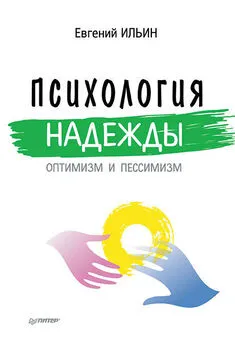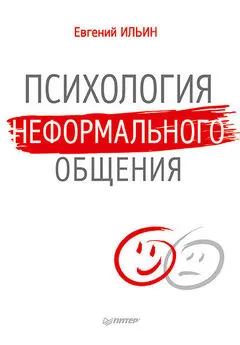Евгений Ильин - Психология совести. Вина, стыд, раскаяние
- Название:Психология совести. Вина, стыд, раскаяние
- Автор:
- Жанр:
- Издательство:ООО Издательство «Питер»
- Год:2016
- Город:Санкт-Петербург
- ISBN:978-5-496-01970-5
- Рейтинг:
- Избранное:Добавить в избранное
-
Отзывы:
-
Ваша оценка:
Евгений Ильин - Психология совести. Вина, стыд, раскаяние краткое содержание
Последняя книга профессора Ильина посвящена важнейшему аспекту нравственности личности – психологии совести и ее составляющих – вине и стыду. До сих пор эта проблема недостаточно изучена в отечественной психологии. В книге описаны имплицитные и научные представления о совести, ее природе, роли и функциях. Рассмотрены вопросы о чувстве долга, эмоции вины и угрызениях совести, различные аспекты переживания стыда. Помимо анализа литературы по данной проблеме в книге приведен обширный библиографический список, а также методики изучения совести, вины и стыда.
Издание предназначено для психологов, педагогов, социологов, специалистов по межличностным отношениям, а также для студентов вузовских факультетов соответствующих профилей.
Психология совести. Вина, стыд, раскаяние - читать онлайн бесплатно ознакомительный отрывок
Интервал:
Закладка:
Murphy J. G. Forgiveness and resentment. Midwest Studies in Philosophy. 1982. № 7. P. 503–516.
Murray C., Waller G. Repeated sexual abuse and behavior psychopathology among nonclinical women: The mediating role of shame. International Journal of Eating Disorders. 2002. Vol. 32. P. 186–191.
Nathanson D. L. Shame and the affect theory of S. Tompkins. M. R. Lansky, A. P. Morrison (eds.). The widening scope of shame. Hillsdale, NJ. The Analytic Press. 1997. P. 107–138.
Nathanson D. L. Shame and Pride: Affect, sex and the Birth of the Self. NY. Norton. 1992.
Neblett W. R. Forgiveness and ideals. Mind. 1874. Vol. 83. P. 269–275.
Neckel S. Achtungsverlust und Scham. Zur Philosophie der Geftihle. Frankfurt a. M. Suhrkamp. 1993. S. 244–255.
Nicholas O. L. Guilt as related to self-concept and personality adjustment. Dissertation Abstracts. 1966. Vol. 26 (7). P. 4080.
Niedenthal P. M., Tangney J. P., Gavanski I. “If only I weren’t” versus “If only I hadn’t”: Distinguishing shame and guilt in counterfactual thinking. Journal of Personality and Social Psychology. 1994. Vol. 67. P. 585–595.
North J. Wrongdoing and forgiveness. Philosophy. 1987. Vol. 62. P. 499–508.
O’Shaughnessy R. J. Forgiveness. Philosophy. 1967. Vol. 42. P. 336–352.
O’Connor L. E. Pathogenic beliefs and guilt in human evolution: Implications for psychotherapy. P. Gilbert, K. G. Bailey (eds.). Genes on the couch: Explorations in Evolutionary Psychotherapy. Brunner-Routledge. 2000. P. 276–303.
O’Connor L. E., Berry J. W. Control Mastery Research: Empirical Studies of Guilt. 1996.
O’Connor L. E., Berry J. W. Interpersonal Guilt: the Development of New Measure. Journal of Clinical Psychology. 1997. Vol. 53 (1). P. 73–89.
O’Connor L. E., Berry J. W., Inaba D., Weiss J., Morrison A. Shame, Guilt and Depression in Men and Women in Recovery From Addiction. Journal of Substance Abuse Treatment. 1994. Vol. 11 (6). P. 503–510.
O’Connor L. E., Berry J. W., Weiss J. Interpersonal guilt, shame and. psychological problems. Journal of Social and Clinical Psychology. 1999. Vol. 18 (20). P. 181–203.
O’Connor L. E., Berry J. W., Weiss J., Bush M., Sampson H. Interpersonal guilt: the development of a new measure. Journal of Clinical Psychology. 1997. Vol. 53 (1). P. 73–89.
Okle E., Mosher D. L. Changes in affective states as a functions of guilt over aggressive behavior. Journal of Consulting Psychology. 1968. Vol. 32. P. 265–270.
Otterbacher J. R., Munz D. C. State-trait measure of experiential guilt. Journal of Consulting and Clinical Psychology. 1973. Vol. 40. P. 115–121.
Palmer L. Evolutionare Psychology. The Ultimate Origins of Human Behavior. 2012.
Parks E. S. The relationship between shame, anger, and narcissism: Exploratory path analysis of the shame-rage dynamic. Dissertation Abstracts International: Section B: The Sciences and Engineering. 2002. 64 (6-B). 2972.
Parrott W. О., Sabini J., Silver М. The roles of self-esteem and social interaction in embarrassment. Personality and Social Psychology Bulletin. 1988. Vol. 14. P. 191–202.
Pascual A., Etxebarria I., Pérez V. Guilt And Shame: Are The Limits Between Both The Same In Castilian, English And Basque? Edu Psykhé. 2007. Vol. 6 (1). P. 3–20.
Patton J. Is human forgiveness possible? Nashville, TN. Abington. 1985.
Perera S. B. The Scapegoat Complex: Toward a Mythology of Shadow and Guilt. Inner City Books. 1986.
Persons R. W. Intermittent reinforcement, guilt and crime. Psychological Reports. 1970. Vol. 26. P. 421–422.
Persons R. W. The Mosher Guilt Scale: Theoretical formulation, research and normative data. Journal of Projective Techniques. 1970. Vol. 34. P. 288–270.
Peterson D. R. The insecure child: Oversocialized or undersocialized? O. H. Mowrer (ed.). Morality and metal health. Chicago. Rand Mac Nally. 1967. P. 459–471.
Phares E. J. Locus of control in personality. Morristown. N.Y. 1976.
Piers G., Singer M. Shame and guilt: A psychoanalytic and cultural study. Springfield. Charles Thomas. 1953.
Piff P. K., Martinez A. G., Keltner D. Me against we: In-group transgression, collective shame and in-group-directed hostility. Cognition and emotion. 2012. Vol. 26 (4). P. 634–649.
Qian M., Andrews B., Zhu R., Wang A. The development of the Shame Scale for Chinese college students. Chinese Mental Health Journal. 2000. Vol. 14. P. 217–221.
Quiles Z., Bybee J. Chronic and predisposition guilt: Relations to mental health, prosocial behavior, and religiosity. Journal of Personality Assessment. 1997. Vol. 69 (1). P. 104–126.
Rahm G. B., Renck B., Ringsberg K. C. Disgust, disgust beyond description – shame cues to detect shame in disguise, in interviews with women who were sexually abused during childhood. Journal of Psychiatric and Mental Health Nursing. 2006. Vol. 13. P. 100–109.
Rawlings E. I. Reactive Guilt and Anticipatory Guilt in Altruistic Behavior. J. Macaulay, L. Berkowitz (eds.). Altruism and Helping Behavior: Social Psychological Studies of Some Antecedents and Consequences. NY. Academic Press. 1970. P. 163–177.
Regan J. W. Guilt, perceived injustice, and altruistic behavior. Journal of Personality and Social Psychology. 1971. Vol. 18 (1). P. 124–132.
Revers W. J. Charakterprägung und Gewissensbildung. Niirnberg. 1951.
Rosenhan D., London P. Foundation of abnormal psychology. San Francisko. Holt, Rinehart and Winston. 1970.
Rotter J. B. Generalized expectation for internal vs. external control of reinforcement. Psychological Monographs. 1966. Vol. 80 (Whole N 609).
Rybak C. J., Brown B. M. Assessment of internalized shame: Validity and reliability of the internalized shame scale. Alcoholism treatment Quarterly. 1996. Vol. 14. P. 71–83.
Sabini J., Garvey B., Hall A. L. Shame and embarrassment revisited. Personality and Social Psychology Bulletin. 2001. Vol. 27. P. 104–117.
Sampson H. Pathogenic beliefs and unconscious guilt in the therapeutic process: Clinical observations and research evidence. Bulletin N 6. San Francisco. The Psychotherapy Research Group (The Mount Zion Psychotherapy Research Group). Department of Psychiatry. Mount Zion Hospital and Medical Center. 1983.
Sarason S. B. The measurement of anxiety in children: Some questions and problems. C. D. Speilberger (ed.). Anxiety and behavior. NY. Academic Press. 1966.
Scheff T. J. The shame-rage spiral: A case study of an interminable quarrel. H. B. Lewis (ed.). The role of shame in symptom formation. Hillsdale. NJ. Erlbaum. 1987. P 109–149.
Scheff T., Retzinger S. Emotions and violence: Shame and rage in destructive conflicts. Lexington, MA. Lexington Books. 1991.
Scheler M. fiber Scham und Schamgefiihl. Zur Ethik und Erkenntnislehre. Miinchen. Deutsche Taschenbuch Verlag. 1957. S. 583–637.
Schmader T., Lickel B. Stigma and shame: Emotional responses to the stereotypic actions of one’s ethnic group. S. Levin, C. Van Laar (eds.). Stigma and group inequality: Social psychology perspectives. 2006b. P. 261–285.
Schmader T., Lickel B. The approach and avoidance function of guilt and shame emotions: Comparing reactions to self-caused and other-caused wrongdoing. Motivation and Emotion. 2006a. Vol. 30 (1). P. 43–56.
Schoenleber M., Berenbaum H. Shame aversion and shame-proneness in cluster c personality disorders. Journal of Abnormal Psychology. 2010. Vol. 119. P. 197–205.
Scholl R. Das Gewissen des Kindes. Stuttgart. 1956.
Sears R. R., Maccoby E. E., Levin H. Patterns of child rearing. NY. Harper. 1957.
Seidler G. H. Der Blick des Anderen: Eine Analyse der Scham. Stuttgart. Verlag Internationale Psychoanalyse. 1995.
Shmemann A. Forgiveness Sunday [Concentric.net.Kyinsman/Shmemann].
Sigelmann E., Fernandes L. M. Development of a guilt measure. Desenvolvimento de uma medida de culpa. Arquivos Brasileiros de Psicologia. 1986. Vol. 38. P. 76–83.
Silverman I. W. Incidence of guilt reactions in children. Journal of Personality and Social Psychology. 1967. Vol. 7. P. 338–340.
Skaderud F. Shame and pride in anorexia nervosa: A qualitative descriptive study. European Eating Disorders Review. 2007. Vol. 15. P. 81–97.
Smedes L. B. Forgive and forget: Healing the hurts we don’t deserve. San Francisco, CA. Harper and Row. 1984.
Solomon R. I., Turner L. H., Lessak M. S. Some effects of delay of punishment on resistance to temptation in dogs. Journal of Personality and Social Psychology. 1968. Vol. 8 (3). P. 233–238.
Stäudlin C. F. Geschichte der Lehre von dem Gewissen. 1824.
Steenhaut S., Van Kenhove P. The mediating role of anticipated guilt in consumers ethical decision-making. Journal of Business Ethick. 2006. Vol. 69. P. 269–288.
Stoop D., Masteller J. Forgiving our parents, forgiving ourselves: Healing adult children of dysfunctional families. Ann Arbor, MI: Servant Publ. 1996.
Stuewig J., Tangney J. P. Shame and guilt in antisocial and risky behaviors. J. L. Tracy, R. W. Robbins, J. P. Tangney (eds.). The selfconscious emotions: Theory and research. NY. Guilford Press. 2007. P. 371–388.
Subkoviak M. J. et al . Measuring interpersonal forgiveness. Paper presented at the annual meeting of the Am. Educa. Research Assotiation. San Francisco, CA. 1992.
Swan S., Andrews B. The relationship between shame, eating disorders, and disclosure in treatment. British Journal of Clinical Psychology. 2003. Vol. 42. P. 367–378.
Switzer D. K. A psychodynamic analysis of grief in the context of an interpersonal theory of self. Dissertation Abstracts. 1968. Vol. 29 (3). P. 381.
Tangney J. P., Wagner P., Fletcher C., Gramzow R. Shamed into anger? The relation of shame and guilt to anger and self-reported aggression. Journal of Personality and Social Psychology. 1992. Vol. 62. P. 669–675.
Tangney J. P. Conceptual and methodological issues in the assessment of shame and guilt. Behavioral Research Therapy. 1996. Vol. 34 (9). P. 741–754.
Tangney J. P. Recent advances in the empirical study of shame and guilt. American Behavioral Scientist. 1995. Vol. 38 (8). P. 1132–1145.
Tangney J. P. The self-conscious emotions: Shame, guilt, embarrassment and pride. Dalgleish Т., Power M. J. (eds.). Handbook of cognition and emotion. NY. John Wiley and Sons Ltd. 1999. P. 541–568.
Tangney J. P. Wagner P., Gramzow R. Proneness to shame, proneness to guilt, and psychopathology. Journal of Abnormal Psychology. 1992. Vol. 101 (3). P. 469–478.
Tangney J. P., Dearing R. L. Shame and Guilt. Guilford Press. 2002.
Tangney J. P., Dearing R. L., Wagner P. E., Gramzow R. The Test of Self-Conscious Affect-3 (TOSCA-3). Fairfax, VA. George Mason University. 2000.
Tangney J. P., Miller R. S., Flicker L., Barlow D. H. Are Shame, Guilt, and Embarrassment Distinct Emotions? Journal of Personality and Social Psychology. 1996. Vol. 70 (6). P. 1256–1269.
Tangney J. P., Stuewig J., Mashek D. J. Moral emotions and moral behavior. Annual Review of Psychology. University of California. Los Angeles. 2007. P. 345–363.
Читать дальшеИнтервал:
Закладка:










